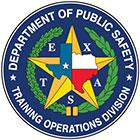 OBJECTIVE:
OBJECTIVE:
The ACT Unit’s objective is training Trooper Trainees in the Trooper Training Academy, commissioned members of the Department, and partner agencies in Use of Force, De-escalation, TASER, OC, Baton, and Control Tactics.
MISSION:
Instill and train a high level of knowledge to protect and defend Texas
VISION:
Seek continuous improvement to the highest standards based upon sound principles in critical thinking, communication, control tactics, and weapon use for the overall well-being and safety of all Texans
MOTTO:
"Failing to Prepare is Preparing to Fail."
Principle-Focused Training
-Encourages Critical Thinking
-Higher Performing Officers equals Higher Performing Agency
-Reduces Policy Scrutiny
-Creates a Foundation for Techniques
-Allows an Officer's Prior Experience to be Used
The Law Enforcement profession requires an officer to be able to make split-second accurate decisions when confronted with a use-of-force scenario, often during periods of intense physical exertion. It is imperative for an individual law enforcement officer to have a strong resolve and endurance, be able to maintain emotional control, and apply proper use of force techniques and decision-making capabilities, all in a highly stressful, constantly evolving environment.
The Arrest & Control Tactics Unit provides training in injury prevention, threat assessment, controlling, restraining, and searching subjects, oleoresin capsicum spray, TASER Instructor certification, baton control techniques, edged weapon awareness, striking and close-quarter tactics, weapon retention, vehicle extractions, ground defense and use of force. Additional instruction in this program includes Use of Force, De-Escalation, Injury Management, and Tactical Simulations Training.
The Arrest & Control Tactics Training Unit utilizes a principle and concepts-based system rather than a technique-based system. This encourages critical thinking, develops high-performing officers for a high-performing Department, reduces policy scrutiny, creates a foundation, and allows for experience to be drawn from.
This program is developed utilizing the "Reasonable Standard" as it relates to Use of Force as set forth in Graham v. Connor.
Additional Services the ACT Unit performs include the following:
- Monitoring the progress of students, documenting their results, and/or recommending remedial and corrective action.
- Participating in remedial instruction for students with training deficiencies.
- Participating in the development and revision of program/course materials in the Arrest & Control Tactics techniques instructional field.
- Assisting in conducting research on emerging technology, practices, and techniques to enhance instructional knowledge and skill.
- Participate in training committees comprising representatives from each of the Department's Divisions concerned with training policies and academic requirements.
Please see the upcoming events below. If you are interested in attending any of these training events, please email ArrestControltactics@dps.texas.gov.
- TX DPS Jiu Jitsu Seminar
- Location: Texas DPS Headquarters; 5805 N. Lamar Blvd. Bldg. B., Austin, TX 78752
- Time: 6:45 am - 7:45 am
- Dates: Every Thursday
- 09/02/2024 - 09/06/2024: ACT Foundations Course
- Location: Texas DPS Headquarters; 5805 N. Lamar Blvd., Austin, TX 78752
- 09/24/2024 - 10/24/2024: ACT Instructor School
- Location: Texas DPS Headquarters; 5805 N. Lamar Blvd., Austin, TX 78752
